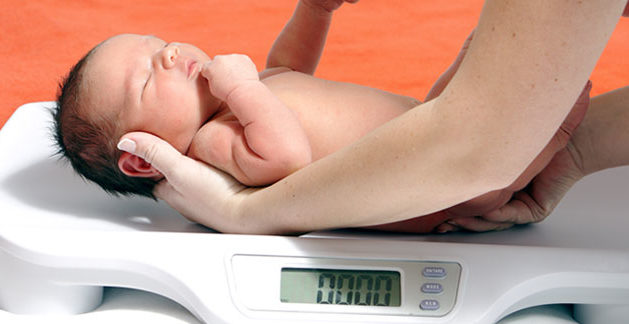Baby weight

‘How’s your baby growing?’ is probably one of the most common questions new parents hear. Your baby’s weight is often considered an indicator of general health. Of course, all babies grow differently, but it helps to know the guidelines of what’s considered optimal weight gain.
What’s the ‘right weight’ for a baby?
Just like adults, babies come in all shapes and sizes! The average birth weight is 3.3kg (7lb 5oz), and most newborns weigh between 2.5kg (5lb 8oz) and 4.5kg (9lb 14oz).
How much your baby weighs is determined by genetics and your health and nutrition through pregnancy. But it’s not how much your baby weighs at birth that’s most important – it’s the rate at which they gain weight afterwards.
Losing weight after birth
Every child follows a growth pattern from birth, and usually the first thing they do is lose weight! This is because it can take a while for them to get used to drinking milk. And if you’re breastfeeding, your body has also got to get used to producing milk too. Many babies lose up to 10% of their weight in the first few days after birth. By about 10 days old, they should have started to put it on again.
Measuring your baby’s growth
Your baby’s growth is measured on a centile chart. Whether big or small, they’re expected to put on weight at a steady pace, staying in the same range on the chart. Just because your baby may be at the top or bottom end of the chart doesn’t mean they are over or underweight.
Make sure you attend your doctor (paediatrician) regularly. Your baby’s growth and health will be carefully monitored and your doctor can answer any questions or concerns you may have.
How much weight should my baby gain?
In the first few weeks your baby will probably gain about 175g to 225g (6oz to 8oz) a week. By about six months they will probably have doubled their birth weight and after this their weight gain will gradually slow down.
The centile charts used to measure growth are just guidelines. So while your baby’s weight should normally stay in their range, don’t be worried if they have the occasional blip. These may be caused by growth spurts, illness, difficulty adjusting to solids or simply burning up more calories as they start to crawl. If you have any concerns about your baby’s groctwth, speak to your door.
Related Articles

Join Aptaclub
Get week-by-week updates on your baby’s development and your pregnancy. Receive expert advice, postal packs for your stage and much more

Know your baby’s
due date
When was the first day of your last
menstrual period?
Know your baby’s
due date
RESULT Estimated due date (40 week full term)
Need advice?
Our team of experts is ready to answer your questions and support you on your journey from pregnancy to toddler hood. For more information and relevant advice, please contact us between 9am-6pm from Sunday to Friday.




